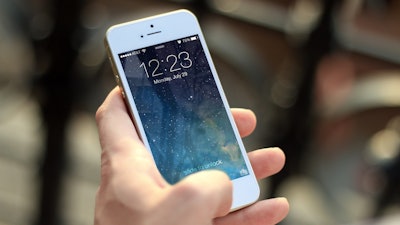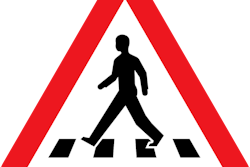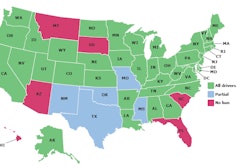
Many industries require their employees to drive, either their own vehicles or company-owned vehicles, as a part of their job duties. However, the landscape industry is one industry that overwhelmingly requires its employees to drive for the job. With the rise of smartphones and the ability to multitask while driving, drivers, employers and legislatures are growing more concerned about distracted drivers.
Know the Law
For example, 16 states banned the use of a handheld cellphone while driving. Generally, these laws prohibit a driver from physically holding a cellphone; writing, sending or reading text-based communications; watching a video or movie; or recording a broadcast while driving. Essentially, the laws only allow drivers to make and receive phone calls in a hands-free manner. While some drivers might find these laws intrusive, the National Highway Traffic Safety Administration finds these laws warranted. In 2016, distracted driving caused 3,450 deaths.
Employers Have Major Liability Issues
Employers face an even greater risk of liability when their employees drive distracted. When a distracted driver causes an accident and harm to others because of their distracted driving while on the job, it is highly common for victims to not only sue the driver, but also the driver’s employer. The rise of lawsuits and jury awards against employers for their employees’ distracted driving is resulting in employers taking serious efforts to address and prevent distracted driving by their employees.
Create a Distracted Driver Policy
The first step is to develop a distracted driving policy. A clear, formal, written policy outlining the dos and don’ts of mobile device use and other driving distractions helps mitigate your liability as an employer, and protects the safety of your employees and other drivers.
Be specific as to what is prohibited and permitted while operating a vehicle on company business. Employers also need to communicate the policy and the consequences of violating the policy to employees early, and often and have supervisors ensure employees fully understand the policy.
At the most basic level, these policies should reflect any state laws. Even if your state does not have such a law in place, the easiest way to protect yourself and your employees is to prohibit the use of mobile phones while driving on company business, driving in company-provided vehicles or with regard to work-related communications.
No Tolerance Policy for Cell Use While Driving
Companies that prohibit all cell phone use, hands-free or not, allow employees to first find a safe place to park their vehicle before initiation or responding to any calls, text messages or emails.
Some employers also require employees to have automatic responses on their cell phones to respond to calls or text messages while the employee is driving, or implement Bluetooth technology in vehicles or on cellphones.
Because cellphones will only become smarter and will continue to provide us with instant communication and entertainment, this issue is not going away, particularly for the landscape workers who are required to drive to their jobsites daily. If you do not have a distracted driving policy in place, now is the time. While liability is always a concern, safety is the paramount concern, and this is an easy first step you can take.

![Doosan Bobcat Wacker Neuson Stack 2ec Js Pb V6e[1]](https://img.greenindustrypros.com/mindful/acbm/workspaces/default/uploads/2025/12/doosan-bobcat-wacker-neuson-stack2ecjspbv6e1.CPyyz8ubHn.png?auto=format%2Ccompress&bg=fff&fill-color=fff&fit=fill&h=100&q=70&w=100)








![Doosan Bobcat Wacker Neuson Stack 2ec Js Pb V6e[1]](https://img.greenindustrypros.com/mindful/acbm/workspaces/default/uploads/2025/12/doosan-bobcat-wacker-neuson-stack2ecjspbv6e1.CPyyz8ubHn.png?ar=16%3A9&auto=format%2Ccompress&bg=fff&fill-color=fff&fit=fill&h=135&q=70&w=240)








